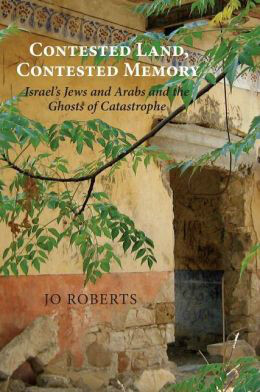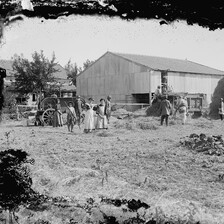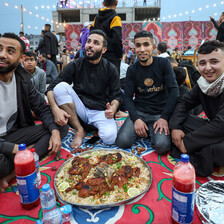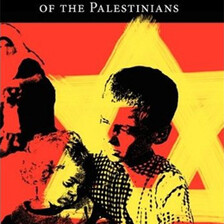The Electronic Intifada 17 January 2014

She examines how “contested histories of the past” currently affect the lives of Jewish and Palestinian citizens of Israel.
Roberts principally analyzes how the respective traumatic histories of Israelis and Palestinians shape their national identities and influence the possibility of their reconciliation.
The author significantly contributes to the historiography of 1948, particularly in her presentation of the lesser-known experiences of displaced Palestinians who remained in what became Israel after the war.
Roberts’s thoughtful book considers the traumas of the Holocaust for Jewish Israelis and the Nakba for Palestinian citizens of Israel through the lens of “social suffering.”
This anthropological perspective examines how individuals and communities perceive and respond to social forces of catastrophic violence.
Original interviews with Palestinian citizens of Israel displaced in 1948, Jewish Israelis who fought in 1948, and Jewish Israelis living on Palestinian village lands, provide insights into divergent memories and viewpoints.
Running away?
Although the first-generation Israeli narrative of 1948 as a miraculous “David versus Goliath” triumph has been disproven by Israeli archival evidence and Palestinian and Israeli oral histories, many Israelis still will not acknowledge any culpability for the Nakba.
The fundamental premise of Zionism is “the understanding, rooted in a traumatic past, of Jews as ongoing victims of outside aggression,” according to Roberts.
The Palestinians’ displacement does not fit into that narrative. “If anything, what was remembered of the Palestinian Arabs was that they ran away,” Roberts writes.
However, the Palestinians’ displacement is not a simple tale of “running away.” In fact, between 1947 and 1949, pre-state Zionist militias and Israeli military forces deliberately forced out some 800,000 Palestinians from over 530 cities, towns, villages and Bedouin settlements in British Mandate Palestine and prevented their return.
The methods used to force indigenous Palestinians from their homes included massacres — such as those at Ein al-Zaytun, Deir Yassin, and Tantura — directed violence against civilians, and psychological terror. The majority of Palestinians were expelled before the British departed Palestine on 15 May 1948.
“Harvest of discrimination”
From a majority population of 1.3 million, an estimated 150,000 Palestinians managed to remain in the territory that became the State of Israel. Those remaining were subjected to martial law, forced labor, property confiscation and ghettoization.
The Palestinians in Israel were also deprived of education and other social services, according to Roberts’ interviewees. “The state has planted bitterness in our hearts,” said one. “We weren’t born with this feeling; it is the harvest of the discrimination we’ve experienced.”
Roberts writes that the “Palestinian catastrophe of 1948 isn’t simply an historical event in the past, over and done with.” Palestinian citizens of Israel continue to experience exclusion, as well as Palestinians in the diaspora.
One Palestinian citizen of Israel says, “I want to have my rights as a citizen of this state … equality for all citizens. The state of its inhabitants, not the state of the Jews.”
Another notes that because of the Holocaust, “Jews have the fear of being destroyed, all the time, even though they have the strongest state in the Middle East.”
One Israeli Jew describes the mindset more subtly as the intrinsic “fear mixed with guilt feelings” of societies built on settlement and displacement.
Israel’s mistreatment of Mizrahi Israelis (Jews from Arab countries) continues unabated. Roberts recounts that Jews have been evicted from their homes on state-coveted lands in urban areas.
After land prices near Jaffa soared, the Israeli government evicted poor Mizrahi Jews from nearby Kfar Shalem without compensation or rehousing. The community evicted comprised Yemeni Jews settled by the Israeli government in 1949 on the lands of Salama, a town from which 7,800 Palestinians were expelled in April 1948.
“I live in her house”
An Israeli refugee from Augusto Pinochet’s Chile living in Kibbutz Megiddo on the ruins of al-Lajjun village, was stunned to meet a Palestinian from al-Lajjun. “I live in her house and she is a refugee. I didn’t know how to cope with this truth,” she said.
Her attempts to share this information with her kibbutz “is perceived as a threat to drive out the Jews,” raising fearful memories of the Holocaust. Her views diverge from most Israelis.
She is willing to reconstruct al-Lajjun as a neighboring Palestinian village on “kibbutz lands,” acknowledging, “in Eastern Europe Jews get back their property and it doesn’t cause a tragedy.”
In sharp contrast to this Israeli social justice activist’s desire to live side-by-side with Palestinians, a 2012 poll indicated that 70 percent of Israel’s ultra-Orthodox citizens support disenfranchising Palestinian Israelis and 71 percent support their “transfer,” that is expulsion from Israel. To some government officials, “even mourning the Nakba is seen as a threat.”
Roberts suggests that while the histories of the Israelis and Palestinians flow together, without recognition of the two communities’ collective memories, “it is hard to imagine peace in the lands.”
Nonetheless, “even flawed acknowledgement of past suffering can build bridges” as was the case with Prime Minister David Ben Gurion’s approach to the West Germans proposing reparations for the lost assets of the murdered Jews of Europe. (Despite fierce Israeli public protests to the agreement, West Germany paid billions to the State of Israel as heir to the victims of the Holocaust.)
“Historical trauma, be it genocide or forced exodus, demands some kind of acknowledgement before reconciliation can begin,” Roberts asserts.
To move beyond trauma-driven memories of the past, “much more of a level playing field” is necessary between the parties, one based on equality and justice to build a hopeful future together.
Rosemarie M. Esber is the author of Under the Cover of War: The Zionist Expulsion of the Palestinians (Arabicus 2008) and an international development professional and gender specialist, including gender-based violence.




